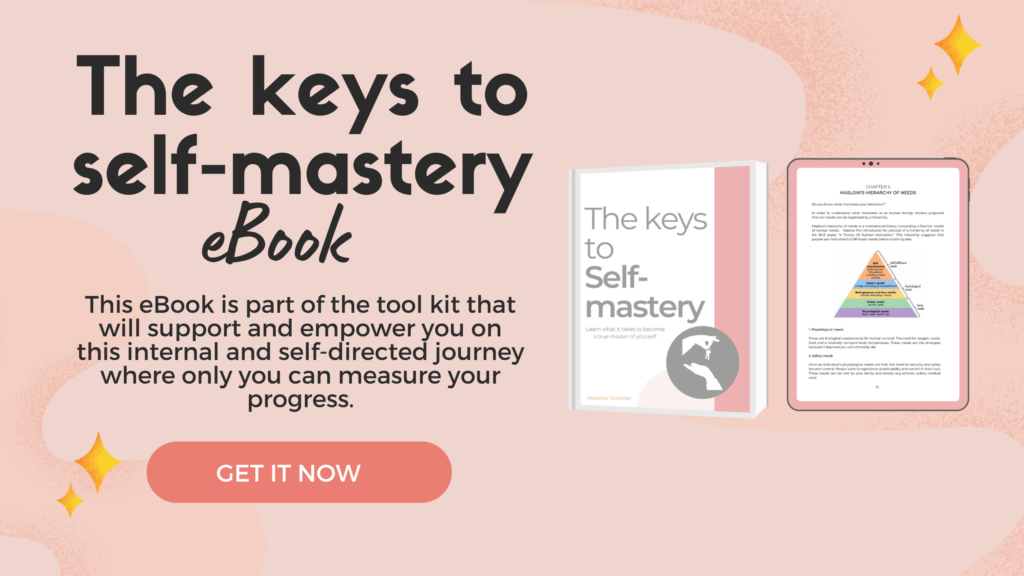
In a world that often emphasises the value of social connections, there’s an important distinction to be made between being alone and feeling lonely.
Many people associate solitude with a sense of isolation or sadness, but the truth is that being alone can be a fulfilling and rejuvenating experience. 😊
In this blog post, I will explore the nuances of being alone versus feeling lonely, understanding the importance of solitude, and embracing the positive aspects of both states.
Let’s get to it. 💕
The Difference Between Being Alone and Feeling Lonely:
Being Alone:
Being alone is a state of physical solitude, where you find yourself without the company of others. It can occur by choice or as a natural consequence of circumstances. Spending time alone provides an opportunity for self-reflection, relaxation, and personal growth.
It allows you to engage in activities that bring you joy, pursue hobbies, or simply enjoy a moment of peace. Being alone can be a deliberate choice, a time to recharge and connect with oneself. 🥰
Feeling Lonely:
Loneliness, on the other hand, is an emotional state that arises from a perceived lack of meaningful connections. It’s possible to feel lonely even in a crowded room if the connections are superficial or unfulfilling.
Loneliness is often characterised by a sense of emptiness, isolation, or a longing for deeper human connections. It’s a complex emotional experience that can impact mental and physical well-being. 😟

Embracing the Positive Aspects of Being Alone:
1. Self-Discovery:
Being alone provides an opportunity for self-discovery. It allows you to explore your thoughts, feelings, and interests without external influences. Use this time to reflect on your goals, values, and aspirations. Self-discovery is a crucial aspect of personal growth and can lead to a deeper understanding of oneself.
2. Independence:
Embracing solitude fosters independence. When you’re comfortable being alone, you become more self-reliant and less reliant on others for your happiness. This independence can empower you to make decisions based on your own needs and preferences, leading to a more authentic and fulfilling life. 🥰
3. Creativity:
Solitude often sparks creativity. When you’re alone with your thoughts, you have the mental space to generate new ideas, think critically, and engage in creative pursuits (yaay). Many artists, writers, and innovators find inspiration in moments of solitude, leading to the creation of meaningful and impactful work. 🎨
4. Rest and Rejuvenation:
Being alone allows for rest and rejuvenation. In a world filled with constant stimuli, taking time for solitude can be a form of self-care. It provides an opportunity to relax, recharge, and focus on activities that bring you peace and joy, contributing to overall well-being.

Addressing the Challenges of Feeling Lonely:
1. Cultivating Meaningful Connections:
If loneliness arises from a lack of meaningful connections, focus on cultivating relationships that nourish your soul. Seek out individuals who share your values and interests. Join clubs, organisations, or communities where you can meet like-minded people. Focus on getting yourself out there. Quality connections are often more fulfilling than a large social circle. 🫂
2. Volunteering and Giving Back:
Engaging in volunteer work or contributing to your community can alleviate feelings of loneliness. By helping others, you not only make a positive impact on the world but also connect with individuals who share a common purpose. Volunteering provides a sense of belonging and fulfillment.
3. Seeking Professional Support:
If loneliness becomes a persistent and overwhelming emotion, maybe consider seeking professional support. A therapist or counselor can provide guidance and a safe space to explore the root causes of loneliness. Addressing these issues with professional help can lead to a more fulfilling and connected life. 🫶
Finding Balance:
The key to a fulfilling life lies in finding a balance between being alone and fostering meaningful connections. Embrace solitude as a time for self-discovery, creativity, and rejuvenation. At the same time, actively cultivate relationships that bring joy and fulfillment. Recognise that both states are essential for a well-rounded and satisfying life. 💕
Conclusion
Being alone and feeling lonely are two distinct experiences, each with its own set of opportunities and challenges. Embracing solitude allows for self-discovery, independence, creativity, and rest. However, if loneliness creeps in, it’s crucial to address it by cultivating meaningful connections, volunteering, or seeking professional support. You are not alone. ❤️
Understanding the nuances between being alone and feeling lonely empowers you to navigate both states with intention and purpose. Ultimately, finding a balance between solitude and social connections contributes to a rich and fulfilling life. Embrace the positive aspects of being alone, foster meaningful connections, and savor the journey of self-discovery in this beautiful dance between solitude and companionship.
Pin this post for a reminder 📌 👇

Related Blogs
Things to Say “No” to for you to Live a Happier Life
How to Stop Settling For Less Than You Deserve
How to Become the Best Version of Yourself: A Guide For 20-Somethings
Habits – Small decisions you make and actions you perform every day.
We all have habits, both good and bad. Habit-forming starts from a very young age, whether it was taking a nap every day after school or writing in your diary every night.
What’s one thing you have to do before your day can start? Is it drink a cup of coffee or tea? Eat an apple from the fruit bowl on your kitchen counter?
These behaviours form a part of your daily routine through your repetitive actions. The way your life is right now is a sum of your habits Scientists say that habits emerge because our brains are constantly looking for ways to save effort. Your brain isn’t trying to be in overdrive every second of the day, it wants to chillax.
Left to its own devices the brain will and make almost any routine a habit.
Cue | Habit | Reward
The process of habit formation that happens within our brains is a three-step loop. First there is the cue, routine then a reward.
Cue: A trigger that tells your brain to go into automatic mode and start your habit.
Routine: The action of your habit which can be physical, emotional or mental.
Reward: Your brain is going to need that dopamine spike in order for your brain to figure out if this particular loop is worth remembering for the future.
Over time this three-step loop will become more and more automatic.
Let’s take for example a smoker. When a smoker sees a cue – a pack of cigarettes, their brain starts anticipating a hit of nicotine. The sight of cigarettes alone is enough for the brain to crave a nicotine rush. If it doesn’t arrive the craving grows until the smoker unthinkingly reaches for the cigarette packet.
How many day‘s does it take to build a habit?
You have probably heard that it takes 12, 21, 33 or 66 days to create a habit. While having a number assigned to it may be encouraging, it can also be misleading.
Here’s the truth: There’s no real timeline.
If you go into the habit-building process expecting the habit to be automated in 33 days and come day 34 and you’re still putting in a conscious effort to start your “habit” you’re going to feel deflated.
The time it takes to establish a habit varies from person to person and habit to habit. Whether it takes you 40 days or 80 days, the exact timeline doesn’t really matter. What will matter is that you’ve created a new habit that you were able to stick to no matter how long it took.
That’s something to be proud of.

1% improvement/ low bar high bar
Acquiring success does not require constant massive action. It’s easy to overestimate the power of one defining moment and not the value of making small improvements daily. Improving by 1% isn’t particularly noticeable but can be far more significant in the long haul. What starts as a small win accumulates into something greater than you can imagine.
It’s only when you look back years later that you see the value of the implementation of the good daily habits you started. This however can be a difficult concept to appreciate in daily life.
One healthy meal a day is better than not eating healthy at all. 10 minutes of reading is better than never picking up the book. 10 minutes of piano practice is better than none at all. It’s better to do less than you had hoped than nothing at all.
The most powerful outcomes of any compounding process are delayed. You need to be patient in order to see results.
You won’t notice how 10 minutes of reading is slowly expanding your brain and you won’t see the effects of 1 day at the gym. You have to believe that what you’re doing daily will pay off in the end.
Don’t let instant gratification get in the way of your results. Stay the course. Your daily 1% improvements determine the difference between who you are and who you want to be. It doesn’t matter how successful you want to be right now, what matters is whether your habits are putting you on the right path for success.
Do habits just disappear?
Habits never really just disappear into thin air. They still live in the structure of your brain which can be of huge benefit to us. Could you imagine having to re-learn how to ride a bike or drive a car every two weeks? That would be a complete nightmare. However, our brains aren’t able to distinguish between a bad habit and a good habit. So, your bad habits are sitting alongside your good habits just waiting for a cue.
How do habits change?
Habits are created by putting together a cue, a routine, and a reward and then cultivating a craving that drives the three-step loop.
There are no specific steps that are guaranteed to work for everybody, but what we do know is that a habit cannot be eradicated it must instead be replaced. If we keep the same cue and the same reward a new routine can be inserted. Almost any behaviour can be transformed if the cue and reward stay the same. For some habits however, there’s one other ingredient that’s necessary: belief.
Once you’re aware of how your habits work and recognize the cues and rewards, you’re halfway to changing it.
Changing habits is one of the most fundamental skills you can learn, as it allows you to reshape your life and reshape who you are.
Who wouldn’t want this transformational skill?

Why you should start small
You should start small so that your new normal adjusts without you noticing as much.
We all like the feeling of comfortability. When you’re used to a set of conditions, trying to deviate from them with a lot of changes will make you extremely uncomfortable. If you make small changes, you don’t notice it as much. After a while, you start to adapt to these small changes, and they become part of the conditions that you’re used to. This becomes your new normal. Changing your life in small steps rather than big ones sets you up for a better chance of succeeding as you are gradually changing to your new normal without much friction.
They’re easier to start
When you’re trying to make a big change in your life, it requires more brainpower, mental commitment, time and energy. If you’re someone like me who has a to-do list as long as their arm every week, then trying to find the time to add on new healthy habits can be difficult.
For example, if you make a mental note that you want to go to the gym for 2 hours every day you may achieve it for a couple of days (that’s if you remember that is) but it will take an extraordinary amount of effort on your part.
A small change for this example could be to plank 1 minute a day as soon as you wake up. Doing this makes it much easier to get started. You could start doing it right now in the middle of this blog post!
You then gradually build up to your end goal, which won’t be as daunting as you would have already built a habit related to it. Also known as “Micro habits” – A really small action that requires minimal motivation or effort to complete.
Remember: Making a habit easy to begin with will make it more likely to do it.
They’re easier to sustain
Let me give you an example:
If you’re someone who usually wakes up at midday but want to switch up your routine and start waking up at 5:30am straight away you’re going to have a VERY hard time trying to sustain that. You may last 1 or two days but that’s not creating a habit, it’s creating a fad. For you to make a drastic step in your sleep routine you need to gradually wake up earlier and earlier each day. Whether it’s 15 minutes, 20 minutes, or 30 minutes.
This type of practice can work in every situation. Whether you’re trying to go to the gym more often or trying to eat healthier. These small increments will make it much easier to sustain than going from 0-100.
When you attempt to create new habits and change old ones there will be times when you will have failed attempts. Don’t see it as a failure of you as a person but a way to learn more about yourself and what to do differently next time.
There will be a lot of trial and error but you won’t know until you try and see what works for you. The people who succeed at habits aren’t the people who never fail- they are the people who keep going after they fail.
What habit are you currently trying to develop?
Related blogs:
How to improve your life one day at a time
How to create the best daily routine
How to raise your standards and live your best life
Are you currently living your life on autopilot and not getting much done? If so, you need to re-evaluate your daily routine.
A routine is a set of habits we develop as a daily practice. Whether you realise it or not, you already have many routines that you do on a daily basis. Whether it’s getting out of bed at a certain time every day or watching your favourite program in your favourite chair at the same time every day.
However, if you don’t take time to analyse each of your routines (morning, afternoon and evening) to see if they bring you closer to your goals then chances are, you’re not going in the right direction.
Having no routine or structure in your life is so much more draining mentally, physically and emotionally than not having a routine at all. Why waste your time figuring out what to do each day, when you can create a routine tailored to your wants and needs?
Lets explore what a good daily routine consists of and how to create an ideal routine that suits you.
First, as you know a routine means: A routine is a sequence of actions that you do repeatedly.
Brushing your teeth and washing your face with your fancy skincare products is a routine. Waking up at 6:30am and going out for a run is a routine. Purchasing hot chocolate from Starbucks on your journey to work is a routine. These actions happen repeatedly and create a rhythm in your daily life.
Why should you create a routine?
Establishing a productive routine is both a self-investment and a way to do your best for the rest of the world.
“In the right hands a routine can be a finely calibrated mechanism for taking advantage of a range of limited resources: time (the most limited resource of all) as well as willpower, self-discipline, optimism. A solid routine fosters a well-worn groove for ones mental energies and helps stave off the tyranny of moods”
Mason Currey
Managing your day allows you to feel more in control. Who likes having their day dictated by other people? I know I sure don’t. You’ll feel more energised and productive with a routine that you know is progressing you further in life. This in turn will help you be more proactive and in control in the face of a stressful situation.
Your routines prime you for success. They help you achieve more than you would by “winging” your day. All it takes is discipline.
Here is a list of actions you should take to help create the best daily routine
1. Make your bed every morning
If there’s one habit you should adopt in your life it’s making your bed every day. Here is some advice from Navy Seal Admiral William H. McRaven:
“If you make your bed every morning, you will have accomplished your first task of the day. It will give you a small sense of pride, and it will encourage you to do another task and another. By the end of the day that one task completed will have turned into many tasks completed.
Making your bed will also reinforce the fact that the little things in life matter. If you can’t do the little things right, you’ll never be able to do the big things right. If by any chance you have a miserable day, you will come home to a bed that is made – that you made. A made bed gives you encouragement that tomorrow will be a better day. “
As Charles Duhigg said in “The Power of habit” – Certain keystone habits can trigger other positive behaviours. If you can change a step in your unhealthy habits you can gear your life to building healthier patterns.
Making your bed doesn’t necessarily mean you’ll have better productivity, but it can lead to a healthier overall mindset.

2. Reflect on your achievements
It’s easy to lose sight of achievements made after a long day. Taking a few moments before you jump into bed to reflect and celebrate your wins big or small puts you in a grateful and happy mindset before you go to sleep. Reflecting on these achievements puts things into perspective and gives you the encouragement to carry on the same flow for the next day.
Reflecting also gives you a better understanding of what’s working and what’s not. This then allows you to make better decisions and change habits that are not beneficial for you. Each time you improve, it helps build your confidence with increased knowledge and perspective.
You can reflect in a number of ways such as jotting it down in a notebook, writing in your gratitude journal and you can also track your productivity with a number of apps such as: “Productive – Habit Tracker, “ Forest” and “ Wunderlist”.
3. Recite affirmations
Affirmations are positive statements that you use to reframe how you think about yourself and the outcome of the future. They are a good way of visualising the good things that will come to you and overcoming negative self-talk.
Affirmations make an impression on your subconscious mind, allowing you to be in alignment with what you want to accomplish. This makes it easier to be in the right mindset before you start your day and when you’re ready to go to bed.
The way you choose to think, day in and day out is just that – a choice. Choose daily positive thinking and watch how differently you see your life.
4. Have a proper breakfast
Breakfast provides the body and brain with fuel after an overnight fast – which is where its name originates from, breaking the fast! Starting the day running on empty is equivalent to trying to drive a car with no petrol.
I HAVE to have breakfast in order for me to have a productive day. Nothing worse than trying to get some work done and your stomach is just grumbling away!
Eating a good breakfast is amazing for your health, as research shows that those who eat breakfast are less likely to be overweight and more likely to be in their ideal weight range compared to people who skip breakfast. If you skip breakfast, you’re more likely to reach for high sugar and fatty snacks mid-morning to get your energy boost.
Probably the most appealing benefit Is that breakfast jumpstarts your metabolism and thus helps you burn more calories during the day. When you eat breakfast, you’re telling your body that more calories are coming throughout the day. When you skip breakfast the message your body gets is that it needs to conserve rather than burn any incoming calories.
5. Clean your home
When you start your day, the last thing you want to see is mess all around you. Without regular clean-up sessions you’ll find your environment in disarray.
Spending 10-20 minutes each day tidying up reduces the stress of having regular deep cleaning days. While it sometimes seems impossible to manage everything on your plate, there are some quick and easy tips to help you get your house in order.
1. Put everything away after use
2. Focus on one room at a time
3. Do the dishes after every meal
4. Set a timer so you don’t procrastinate
5. Do a load of laundry daily
6. Give everything it’s own space to live
7. Make your bed as soon as you wake up
8. Keep basic cleaning supplies close to where you use them
6. Exercise
Even though exercise can happen at any time of the day, many experts suggest that the morning is the best time to take part in physical activities. Exercising in the morning is a great way for helping the body jump-start your metabolism and burned stored fat.
A general recommendation is to exercise 30 minutes each day, this amounts to only 2% of your day! Exercising is a no-brainer when it comes to what you should incorporate into your daily routine. Is it going to be easy? Nope. Is it going to be worth it, absolutely!
Start thinking today about how you’re going to incorporate exercise into your daily routine. If you already do, think about how you can start mixing it up. Keeping things fresh keeps your mind engaged, making you less likely to give up.

7. Read
Becoming an avid reader was one of the best things I’ve done for my creativity and mental wellbeing. The first book I ever read for my personal growth was The Power of Habit by Charles Duhigg. It was this book that started my daily reading habit and would urge anyone who wants to learn more about habits to read that book!
A daily dose of reading can do wonders for your relationships, health and memory.
Want your vocabulary to improve? Read
Want to develop your self-discipline? Read
Want to boost your IQ? Read
Pick up a book today and spend a minimum of 15 minutes reading. Get yourself in a nice comfy area with a hot cup of tea and let your imagination loose.
8. Spend time with family/friends
One of the best ways to combat stress is to spend time with your loved ones. The smiles, the belly-aching laughter, the sincere joy that you feel when they’re around is what you should aim to feel daily.
Who are you thinking about right now as you’re reading this? Give them a call or text to meet up later or during the week and have a good laugh. You deserve to enrich your life with positive and encouraging people around you.
Don’t underestimate the power of having a solid support system around you. It makes going after your goals even easier and allows you to celebrate your wins both big and small with the ones that matter most.
In Summary
Following a daily routine can help you establish priories, keep track of goals, limit procrastination and make you healthier. It helps lower your reliance on self-discipline and motivation due to the repeated action causing the right habits to be formed.
Since creating and following a routine of my own, I have more drive and motivation which makes reaching my goals a lot easier. I show up every day with more mental and physical energy which get me through my tough days.
Remember: What works for someone else, might not work for you. This is why it’s vital to pick activities that resonate the most with you and put you on the path to task and goal completion. The key is to create regular and consistent daily patterns that will take you to where you want to go in life, helping you maximise yourself on every possible level.
There is a whole module in the How to set goals and achieve them mini-course dedicated to creating your ideal 24 hours! Learn how to create a morning, afternoon and evening routine that gets you closer to completing your life-changing goals. Don’t wait any longer to get what you want out of life. You are deserving of that dream life. Let me help you get started > How to set goals and achieve them mini-course
Related blogs:
How to improve your life one day at a time
Did you know that people on my email list sometimes get exclusive discounts on my products? Join the community and save yourself some coins!
Freshly-squeezed inspiration, and no-nonsense tips + tricks to improve your life delivered to your inbox weekly.
Subscribe to my newsletter
Subscribe
You're all signed up!
Be sure to whitelist our email address so that all the goodies make it to your inbox.

